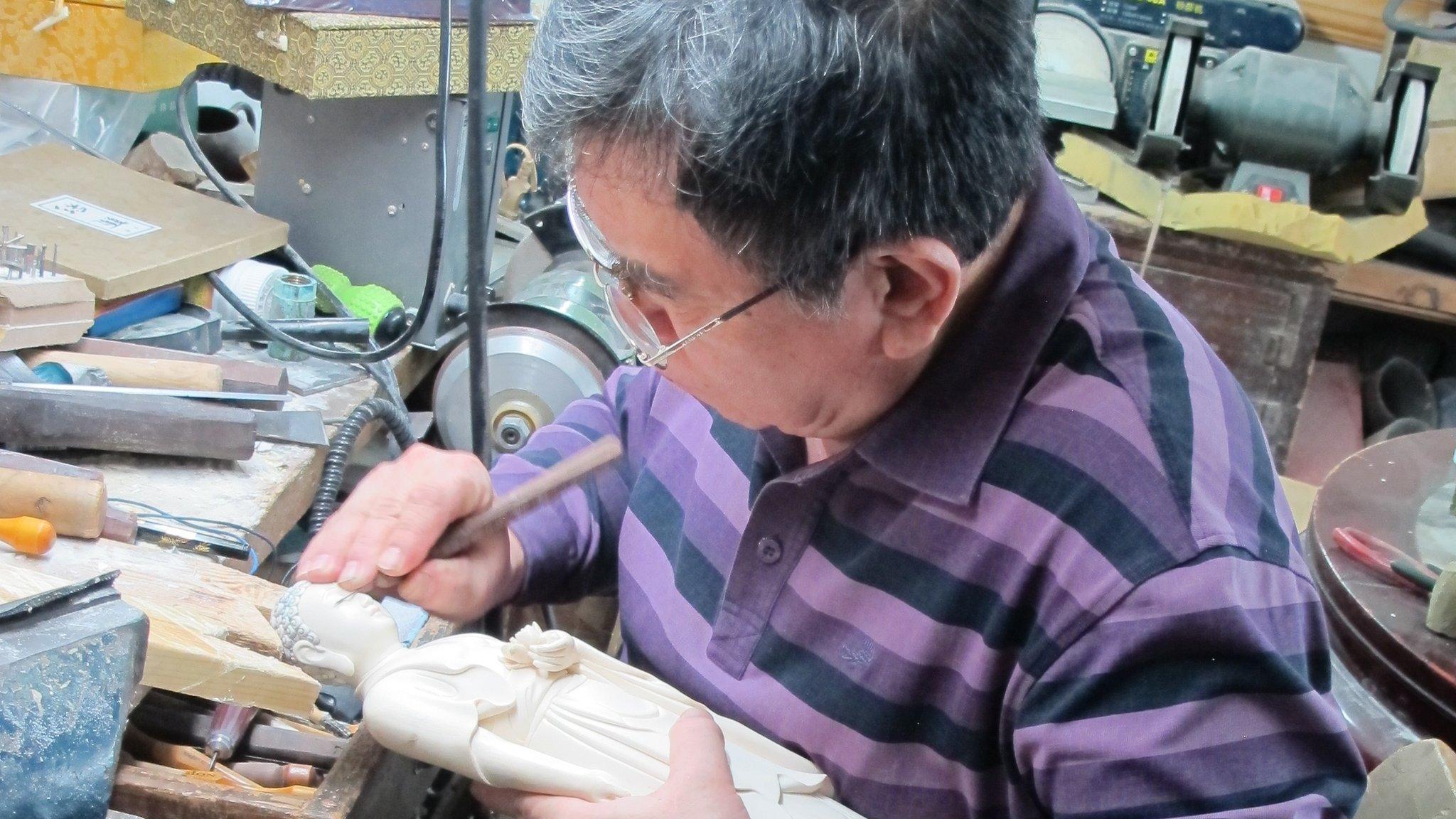Uncovering China's illegal ivory trade
- Published
Damian Grammaticas reports
A major conference in London is considering how to protect Africa's wildlife, including rhinos and elephants, from an unprecedented surge in illegal trafficking. Conservationists warn that the growth in the illegal ivory trade means elephants could be wiped out in parts of Africa in the next few years. As demand from China pushes levels of poaching and smuggling to new highs, we investigate China's illegal ivory traders.
In a nondescript shopping mall in Beijing sellers offering antiques and artworks are crammed together. The shops are piled high with stone carvings, jade and ivory. Some have whole elephant tusks on display, others ivory figures, statues and intricately worked scenes.
As soon as we enter one shop with cabinet after cabinet of carvings, the owner gets tense and defensive. "We have a licence. We have a legal licence to sell ivory. It's hanging there," he says pointing to the wall.
China has around 150 legal, government-licensed ivory shops. This is one of them. They are the only places allowed to sell ivory to individual buyers. The government says ivory carving is an ancient art it wants to keep alive.
Chinese consumers, increasingly wealthy, desire ivory. Some think it is lucky, while for some it is a way to display their status. Others see it as a good investment and many give ivory as a gift or bribe to win favour with an official or business contact. It is certainly good business.
"I've been in this business more than 40 years. I don't get involved in anything illegal," says the shopkeeper. When we ask why he's so worried, he says: "There are illegal shops. But it's a case of 'one rotten egg spoiling the whole soup'."

Pieces of ivory sold legally need to have photo ID - but the products do not always match the cards
China's government was given permission to import one consignment of more than 60 tonnes of ivory from Africa six years ago. Pieces carved from that legal stockpile can be sold in China as long as they have a driving-licence-sized photo identification.
But when we look closely at the pictures on the photo IDs in the shop we are in, the images do not quite match the carvings on sale. When we ask about the discrepancy the shopkeeper tells us it is time to leave.
"It's just a matter of the angle the picture is taken from. You shouldn't make a fuss about it," he says, adding: "I'm off. I'm closing now. I told you. It's an angle problem."
It is a common scam. Reusing old IDs to sell new pieces of ivory can be a way of laundering ivory that is not from the legal stockpile but illegal, smuggled into China.
Cracking down
Last month Chinese customs officers destroyed six tonnes of seized ivory. It was a signal that China is trying to tackle the problem.
Watching the event, John Scanlon, secretary general of the Convention on International Trade in Endangered Species (Cites), the body regulating the international trade in endangered species, told reporters Africa's elephants were increasingly threatened.
"In 2011, we had 25,000 elephants illegally killed on the African continent. Last year, it was 22,000. So that was almost 50,000 elephants illegally killed for their ivory in just two years. This is decimating the African elephant population and we will soon see local extinctions in some areas, in particular within Central Africa."
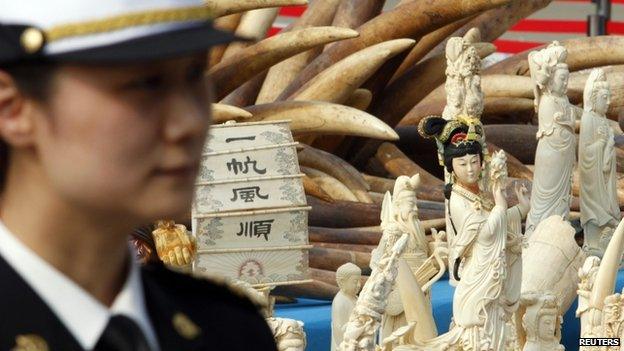
China crushed six tonnes of ivory last month
To evade the current crackdown China's ivory traders are moving online. Selling ivory on the internet is illegal and major websites have banned it. But on sites specialising in auctions, antiques and collectables it is easy to find dozens of photos of ivory pieces for sale.
We made contact with one trader. He met us in a Beijing hotel.
The BBC made contact with one trader and met him in a Beijing hotel.
"People I know who specialise in this trade are already in jail. This business is banned in China," he said.
"We have a new police chief in Beijing. They have started to monitor it very strictly."
He told us it was getting harder to import and move ivory. Taking it on trains or even the subway was impossible as all bags had to go through airport-style security. Sending it by courier was risky too, he said, and even ivory being moved in bags on public buses had been seized.
Rising prices
Once he was convinced we were genuine buyers he produced a large tusk.
He said it was smuggled ivory, 57cm (22 inches) long, weighing 2.7kg (6 pounds), the asking price 77,000 Chinese yuan ($12,700; £7,600).
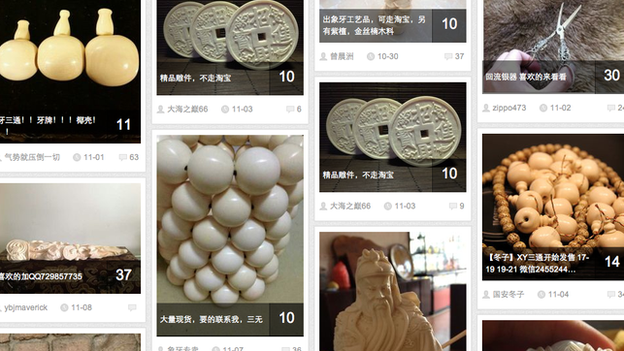
China's crackdown has driven the ivory trade online
The trader insisted this was some of the best quality ivory available, taken from an elephant not long after it had been killed, and carved with mythical figures.
"Here on top there's a phoenix, here a dragon," he said. "There are different types of ivory, white, yellow and blood ivory. This is close to blood ivory. It's the best."
And, he added, the crackdowns themselves are pushing up the price of ivory, making it even more attractive to investors and more profitable for sellers.
"There are lots of ivory collectors. But there's less and less ivory available. So the price is shooting up every day," our seller told us.
He left with his tusk and has since been in contact, apparently keen to make a sale.
Demand from China is a major factor in the surge in poaching and smuggling.
Some believe the answer is a total ban on ivory sales. China does not want that.
But while the buying goes on, so does the killing, pushing elephants in parts of Africa towards extinction.
- Published24 January 2014
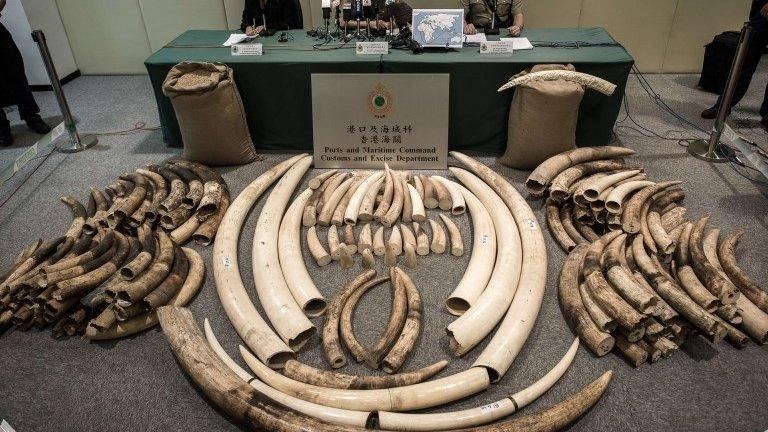
- Published6 January 2014
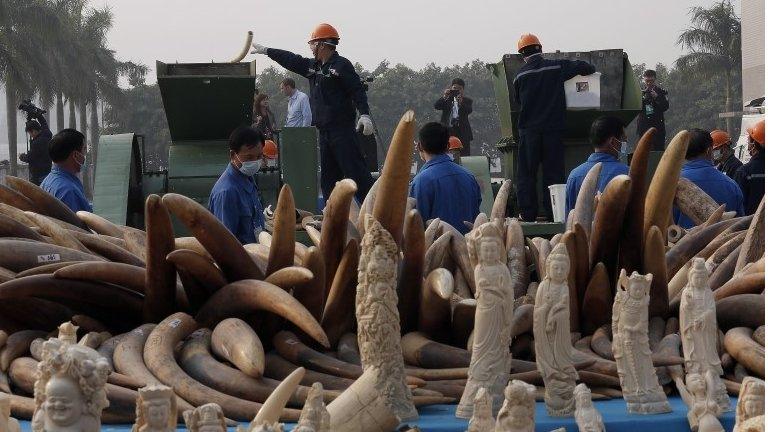
- Published18 November 2013
